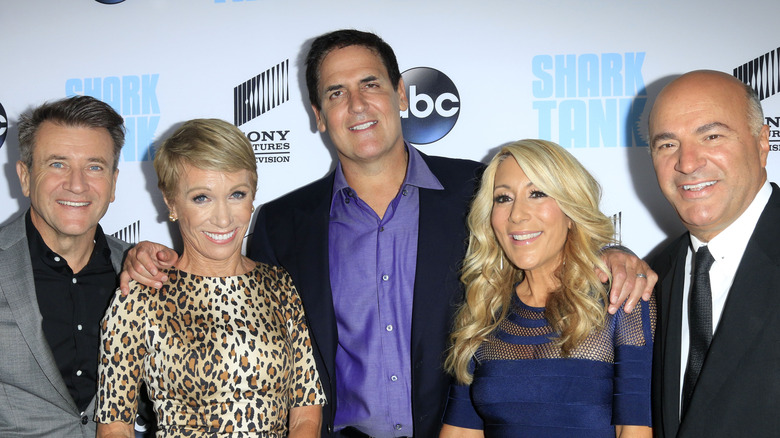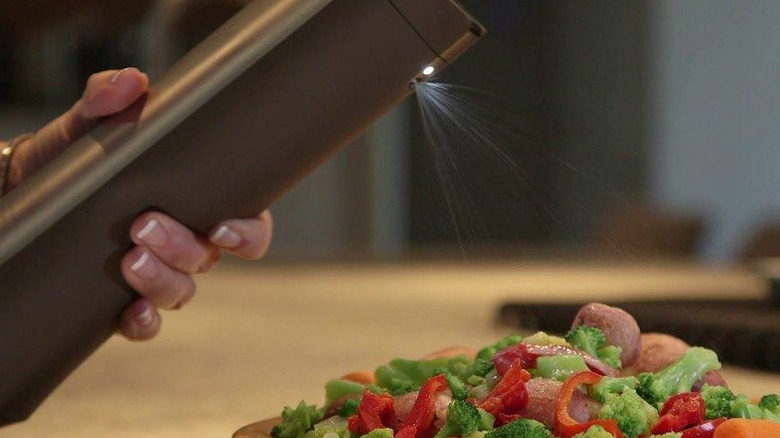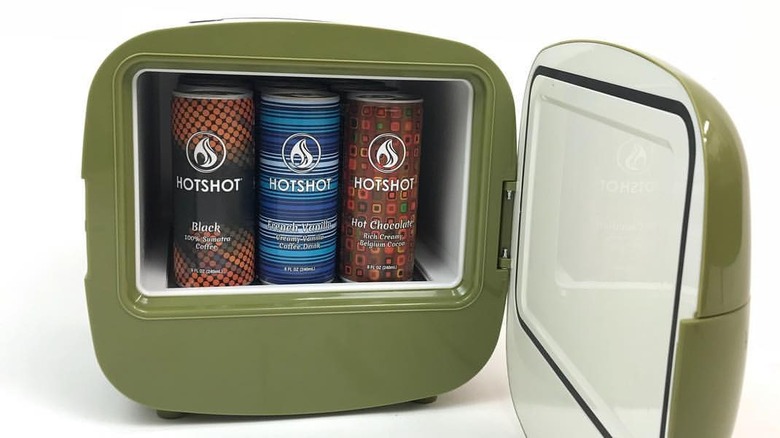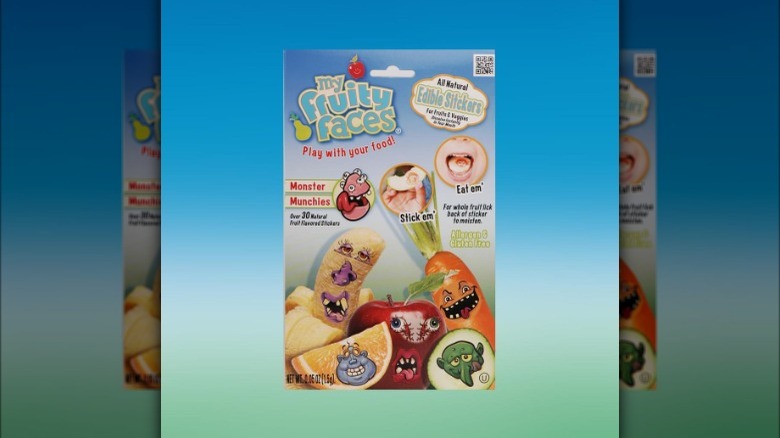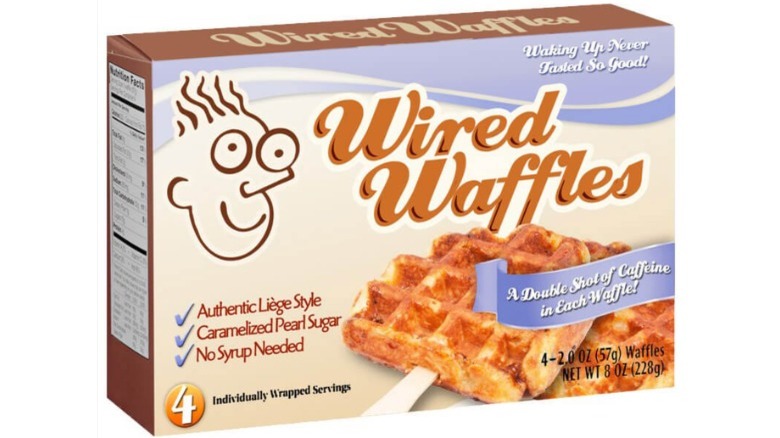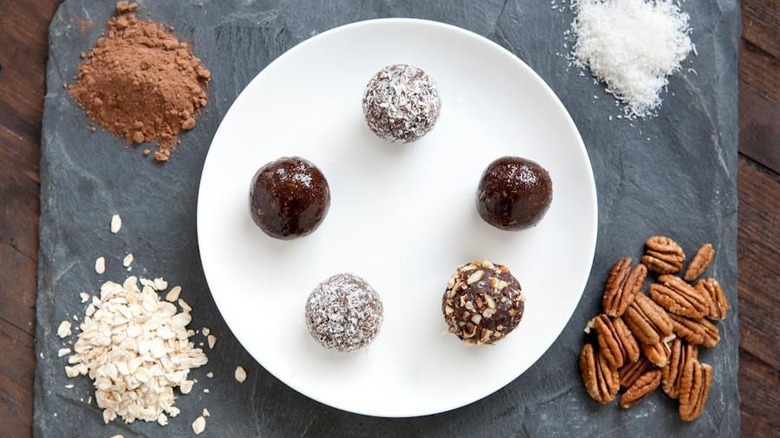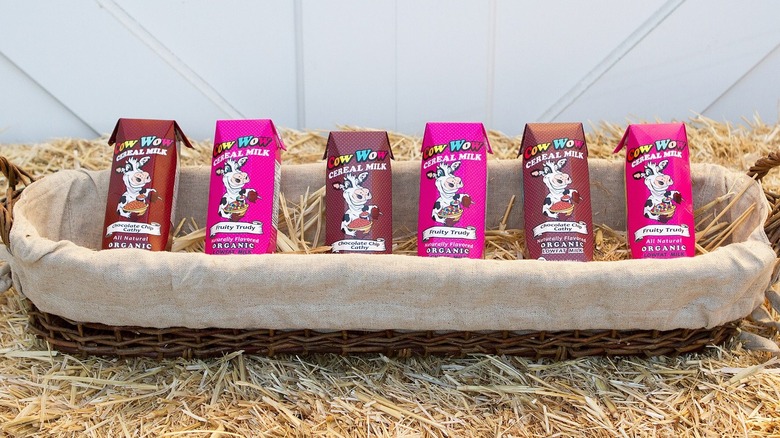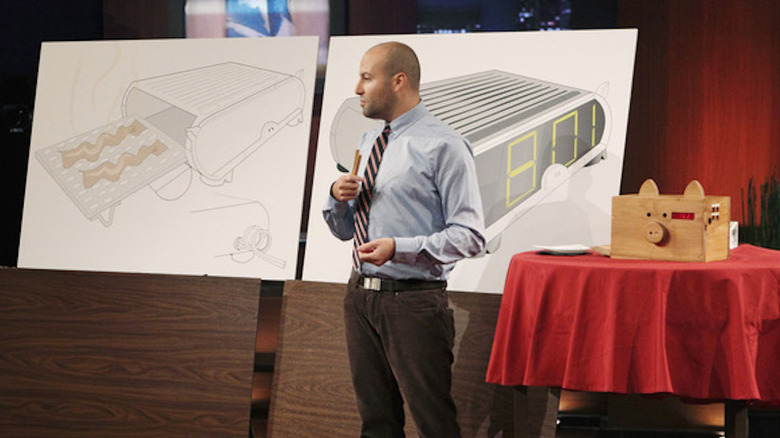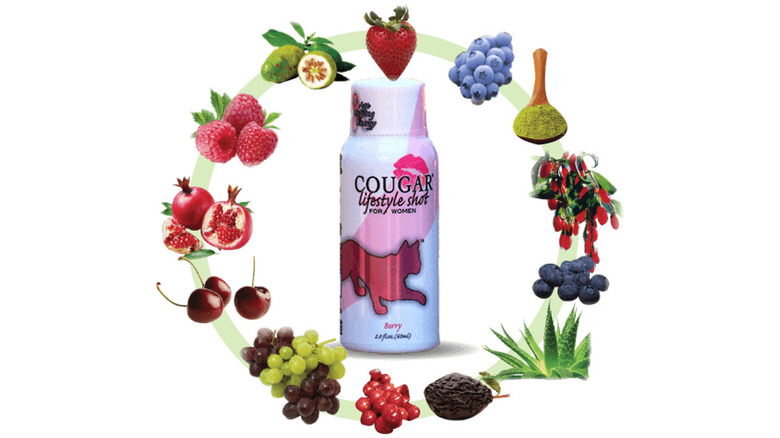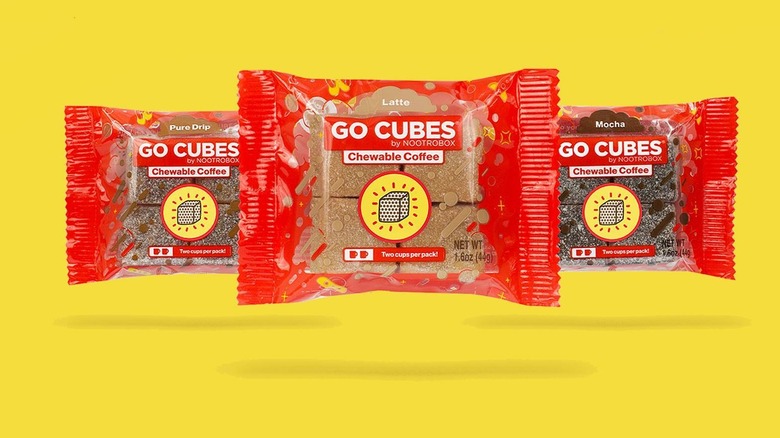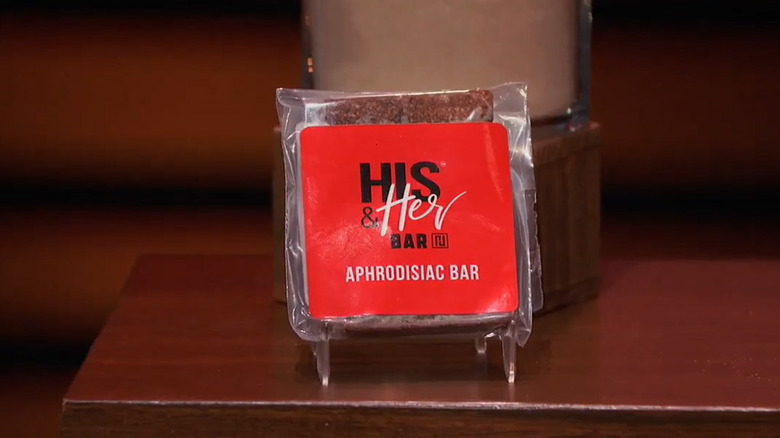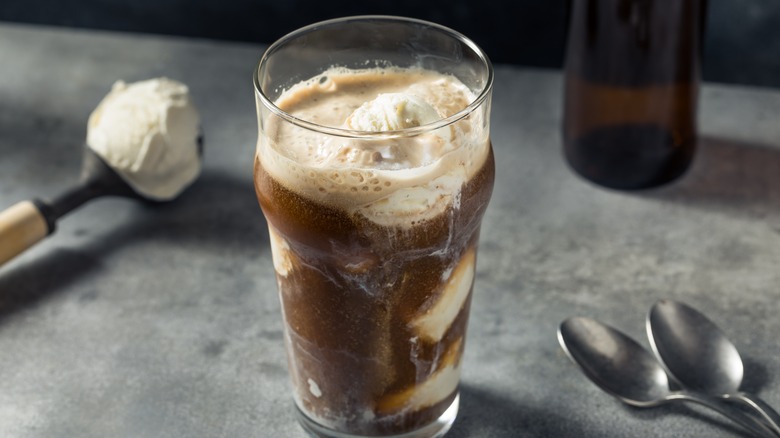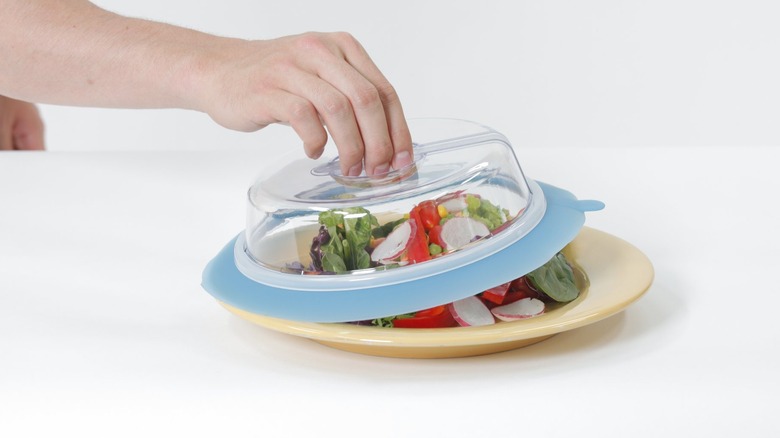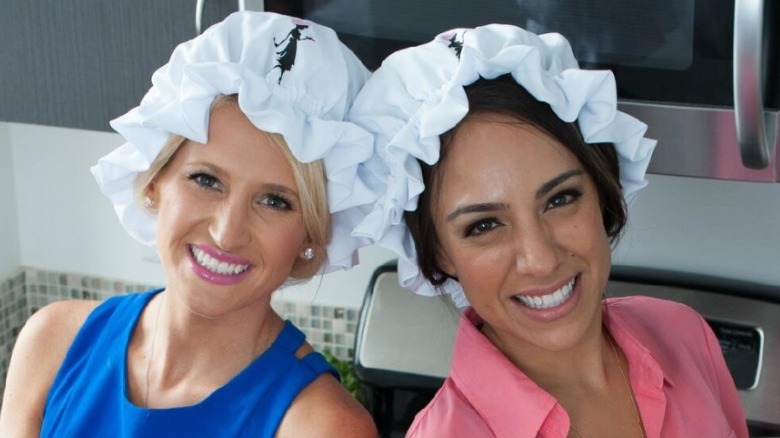Shark Tank Food Inventions That Flopped
"Shark Tank" has been gracing our screens for more than a decade and there seems to be no end in sight. Just when you think you have seen it all, entrepreneurs show up with something new and exciting that has viewers screaming "why didn't I think of that?" Food inventions are among the most common pitches on the show and The Hustle reports that 20% of the pitches fall in this category.
But not everything is a winner and for every Scrubdaddy there is a Breathometer. Companies fail both in the Tank and after the cameras stop rolling even though you would think that after 14 seasons, entrepreneurs would have figured out a recipe for success. Some of the biggest mistakes participants can make are approaching the Sharks before they have solid sales figures, before their product is market ready, or with a product that cuts out too much of the market with a niche target audience. Some simply can't swim with the Sharks and are left drowning in debt after the show airs. Whether it was bad sales or a poor business plan, here are the top "Shark Tank" food inventions that flopped.
Biem Butter Sprayer
If Julia Child taught us anything, it is that everything tastes better with butter. One inventor took this a step further and developed a promising gadget called Biem that makes a regular stick of butter sprayable. Lori Greiner invested a whopping $500,000 for a product that was expected to sell thousands of units, but Biem's promises didn't stick and it wasn't long before things started to fall apart.
The Better Business Bureau received more than 30 complaints about the product being dysfunctional and return policies not being honored. Customers also waited several months for their sprayers to arrive and were bitterly disappointed when their $130 purchase did not live up to the hype. Lori's company released a statement saying that they never invested capital into the company after the show aired. "Lori Greiner has no affiliation with this company. She did not make an investment after the 'Shark Tank' episode aired because they did not have a working prototype during due diligence, so Lori passed on the deal," explained Dan Greiner, COO of Lori Greiner Companies (via Fox San Antonio).
HotShot
Danny Grossfield found inspiration for his hot coffee-in-a-can in Japan but the Sharks agreed that the ready-to-drink coffee market is already too saturated on the home front. HotShot is a series of coffees in special cans with insulated labels to protect your hands from the 140-degree liquid inside. The catch was that your cans needed to be stored in his patented HotBox. He also developed hot fridges for convenience stores, movie theaters, and stadiums.
Although the Sharks were all out (with Lori even suggesting Danny bows out too), Mark Cuban gave the entrepreneur hope by saying he would consider testing the product in his theatres. But the $6 billion Japanese market did not translate well to the States and HotShot stopped selling its product commercially in 2019 shortly after launching on Amazon. Robert Herjavec predicted the product would fail due to the difference in Asian and American markets as American consumers already had a massive selection of to-go coffee options available. Many Amazon consumers were also misled by the concept, thinking their cans would arrive hot and not knowing about the HotBox, tarnishing the brand's private consumer appeal and putting the final nail in the coffee can.
My Fruity Faces
On Season 7 of "Shark Tank," two entrepreneurs had an idea that was set to change the face of healthy eating for kids. My Fruity Faces was a sheet of edible stickers that kids could stick onto fruit and veggies to create fun characters. Despite the adorable toddlers that demonstrated the product, Adam Gerber and Bob Ntoya failed to land the $200,000 investment they needed. The Sharks tore their idea to shreds and found quite a few cracks in their business model.
The pair of creators were close to $180,000 in debt and they had only $2,000 in sales in the month leading up to their pitch. The last bit of bait they could throw at the Sharks was a Nickelodeon licensing deal allowing them to print characters like Spongebob or Dora the Explorer, but this deal had expired. Mark Cuban admittedly enjoyed the product but his business senses were tingling and he explained that he didn't want to try and find out what was wrong with the company. My Fruity Faces eventually shut down in 2018 but both entrepreneurs are still chasing their dreams with Ntoya developing CBD edibles and Gerber pursuing a real estate career.
Wired Waffles
Here is one simple tip when entering the Tank: Don't get the Sharks hopped up on caffeine. This was one of the more explosive pitches on the show and the Sharks were hungry for blood, attacking each other and the creator of Wired Waffles. Roger Sullivan created this fusion to give consumers their daily dose of caffeine along with a delicious treat. Unfortunately, the waffles weren't very delicious and one waffle had enough caffeine to power a small truck. The Sharks were left unimpressed by the dry and stodgy texture of the waffles and the unappetizing taste but it was the product's potential logistical issues that left Sullivan floundering.
Lori noted that the waffles posed quite a safety hazard as kids could easily be duped into buying the product with dangerously high levels of caffeine. Sullivan also couldn't back his product with promising sales figures and admittedly only sold $1,000 worth of product the month before the taping. He claims the waffles were stale and cold because he had to unwrap them 30 minutes before his pitch but the liability concerns and low sales figures were the ultimate red flags for the Sharks. The company folded in 2015 and Sullivan went on to distill Eve's Apple Pie Moonshine, which achieved moderate success.
PMS Bites
Millions of women suffer from PMS-related symptoms. Many report that food cravings are some of the most prominent symptoms. This hankering for sweet stuff was something Tania Green wanted to take control of. Tania created a healthy, vegan alternative to sugary snacks made with dates and cocoa and infused them with herbs to allegedly combat PMS symptoms. PMS Bites ticked all the boxes: healthy, delicious, and easy to produce. But for the hungry Sharks, this simply didn't cut it.
Even though Green was only seeking $50,000 and was willing to part with 20% of her company, the Sharks had bigger fish to fry that day, noting that the market segment was too small. Barbara Corcoran stepped out because she wasn't a fan of Tania's energy, explaining that a salesperson needed a little more oomph. Both Robert Herjavec and Kevin O'Leary weren't impressed by her small sales figures to date and Mark Cuban suggested she focus more on social media marketing than landing in-store deals. Tania went on to sell her product in around 15 stores but she never achieved the commercial success she hoped for. The last post from the company's Facebook page came in 2017, about a year after airing, and the company officially closed in 2018.
Cow Wow Cereal Milk
The taste of chocolatey delicious milk at the bottom of a cereal bowl is something that really takes us back to the good old days. However, Cow Wow Cereal Milk only takes us back to Season 5 of "Shark Tank." Tiffany Panhilason and Chris Pouy are two food entrepreneurs who invented a cereal-flavored milk box to promote milk consumption among kids. Unfortunately, one 8-ounce box of Cow Wow had more calories than a 12-ounce can of 7UP or a normal glass of milk (via Food Processing), making it a less-than-ideal choice for a healthy treat.
The first Shark to jump ship was Daymond John but this was more because of his lactose intolerance than anything else. Mark Cuban saw the bigger picture and told the creators that the market was simply too saturated. He explained that big brands, both cereal and milk producers, could take over the industry in a heartbeat and leave Cow Wow eating crumbs. Lori, Steve, and Kevin all went on to emphasize their dislike of the product, and the Cow Wow team left without a deal. The creators went on in search of greener pastures in 2014 and Cow Wow is now part of the "Shark Tank" graveyard.
Wake N' Bacon
Who can forget the fateful morning that Michael Scott burned his foot on the George Foreman grill? One man's dream to wake up to the smell of bacon became another man's entrepreneurial venture, and Matty Sallin brought his bacon-making alarm clock to the Tank. Matty's adorable wooden clock seemed like a carnivore's dream and even bore the slogan "Rise and Swine," but would the Sharks take the bait?
But when the Sharks started breaking down the logistics it was clear that there was a flaw in his plan. Kevin O'Leary got straight to the point: "You have no projections whatsoever. You've got a pig box that's going to catch fire and kill somebody and I'm going to be sued into the stone age. I'm out." (via Shark Tank Blog) The hygiene factor was also up for debate considering you would have to leave raw meat on your bedside table through the night. What was probably the biggest downfall was that Matty only had a prototype. The Sharks make no secret of the fact that they want products with a proven sales history and a well-structured business plan. Wake 'N Bacon got the chop and never made it into production. Our cholesterol levels thank you, Sharks.
Cougar Energy Drink
The term "cougar" is loaded with innuendo, but Ryan Custer was eager to market his energy drink to an audience of mature women. This energy shot was loaded with extracts from 13 different super fruits and was said to aid in weight loss, keep your hormones balanced, help with hair and nail health, and give you a 5-hour energy kick.
The Sharks backed out in quick succession and their arguments ranged from the size of the market to the taste of the product. When Ryan went into the Tank, he had only sold $60,000 worth of products in 3 years, a fact that did not get the Sharks excited. Barbara Corcoran also described the taste as being chalky and Kevin O'Leary broke down the numbers, explaining that around 75% of the market was excluded from the cougar demographic. Ryan left the Tank without a deal and he continued to sell his product online but Amazon reviews like "This is offensive to women" and "Chalkboard aftertaste. Overwhelming sweetness!" didn't do him any favors. Cougar Energy quietly bowed out of the market soon after the show aired and Ryan works as a real estate agent.
Go Cubes
A common thread among failed "Shark Tank" food inventions is entrepreneurs trying to reinvent the wheel (but breaking it instead). They make wet things dry, sweet things salty, and the worst offense of all, making drinks chewable. Michael Brandt and Geoffrey Woo wanted us to replace our coffee routine with a caffeine gummy that could be performance-enhancing. Biohacking, as the pair of inventors described it, would help you tap into your true potential and make you more mentally alert. Two cubes should substitute for one cup of coffee according to the packaging and the product came in three flavors: latte, mocha, and pure drip.
The biggest shock came when the Go Cubes creators asked for a $2 million investment for only 5% equity. This valued the company at $40 million, a "Shark Tank" record at the time. These caffeinated cubes didn't get the Sharks going and they all quickly stepped out. Some were worried about the long-term health effects while others were less than impressed with the stiff delivery of the pitch and the massive valuation. Go Cubes continued to sell online for a while, but the company eventually rebranded itself as HVMN and found more success selling brain-boosting nutritional supplements.
His & Her Aphrodisiac Bar
When a pitch starts with a cringy rap, we already know we are in for a wild ride. Jennifer and Michael Gallagher had us blushing, laughing, cringing, and crying all in the span of a few minutes. The pair created the world's first aphrodisiac bar that was designed to be a lifestyle supplement and increase your libido with continual ingestion. Their secret ingredient was maca root and Jennifer explained that it was often called "Peruvian Viagra."
The bars failed to excite the Sharks and the pair were left high and dry. The company was started out of necessity as both Jennifer and Michael lost their jobs and their house was in foreclosure. Lori put it best when she said that this was just not their million-dollar idea, yet. The company had only $2,000 in sales by the time of filming and shut down completely shortly after their episode aired. Their Instagram page has been set to private and their bio now reads: "Our episode on 'Shark Tank' was filmed in 2020 & since then we have decided to move into another direction w/our biz ventures thanks for watching!"
Brewer's Cow Ice Cream
One of the fatal flaws of a new food invention is when the idea sounds so gross you have to convince your audience to try it. You don't have to invite us twice to try pizza cupcakes or burnt cheese snacks but beer-flavored ice cream is a bit harder to swallow. Brewer's Cow Ice Cream was 10 years in the making before Steve Albert, Larry Blackwell, and Jason Conroy took their tubs into the Tank. The trio was dealt a bad hand with Daymond John being in the Tank that day as he famously steps away from any dairy products immediately due to his lactose intolerance. The other Sharks loved the flavor but that wasn't enough to win them over.
As Kevin O'Leary and Mark Cuban started to grill them on sales figures, the pitch ran away from the Brewer's Cow team and they stumbled over their words. They struggled to recite projections, expense figures, and profit margins at the rate that the Sharks wanted and they all soon dropped out. This is an unfortunate case where the business model was not able to back up a great product. Their episode aired in 2012 and the company folded around 2 years later. They might have been a little ahead of their time as big brands like Ben & Jerry's and Häagen-Dazs jumped on the beer train not long after the company shut for good.
Plate Topper
Securing a deal in the Tank is not the one-way ticket to paradise many might assume. A shark's handshake is not binding and they reserve the right to back out of a deal if they smell something fishy during due diligence. Plate Topper had everything Lori Greiner could possibly look for in a product and she smelled money. It was simple, easy, and cheap to manufacture, and solved a problem that millions of people had — food storage. Michael Tseng came into the Tank seeking a $90,000 investment but was only willing to part with 5% of his company. Greiner was able to squeeze 8% out of Tseng and the entrepreneur left the Tank thinking he had sealed his fate.
It was later revealed that Lori had some difficulty working with the Princeton engineer and she had some interesting thoughts during an AMA session on Reddit. "Plate Topper guy was stubborn and didn't listen to anything anyone had to say. Same in the Tank. Can't go forward with that" she wrote. Shark Tank Tales also noted that Lori tweeted a follow-up remark the day that the episode aired. "Sorry to say I wound up not liking his tactics much either, that agony didn't end in the Tank. I'm out!" The plate topper went out of business but Prestagon LLC has various other kitchen and homeware products available on Amazon that seem to be doing well.
Kookn' Kap
"Shark Tank" provides a platform for entrepreneurs to show their concepts and products that we simply can't live without. But occasionally, a product slips through that is only good for a laugh. The Kookn' Kap was one of these head-scratching inventions but inventors Juli Deveau and Ozma Khan had their sights set on being as big as the Snuggie. This Bo-Peep style bonnet was supposed to keep cooking smells out of your hair.
The biggest snag, as Lori pointed out, was that there was no discernable difference between the Kookn' Kap and a regular shower cap. If you wanted to look silly in the kitchen, you probably wouldn't spend an extra $12 to do so. Barbara also pointed out that the caps had a "flammable" warning, despite the ladies saying the cap was flame resistant. The Sharks made quite a stink about their dislike for the caps and Ozma and Juli left empty-handed. They made a last-ditch effort with online sales but the company closed a few months after their episode aired.
